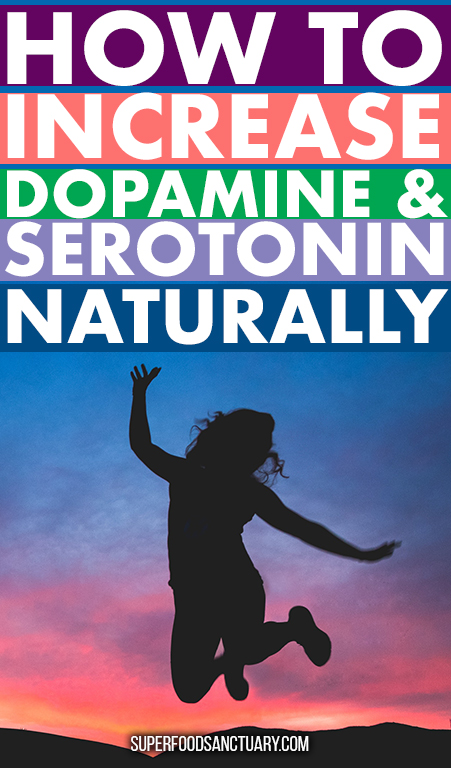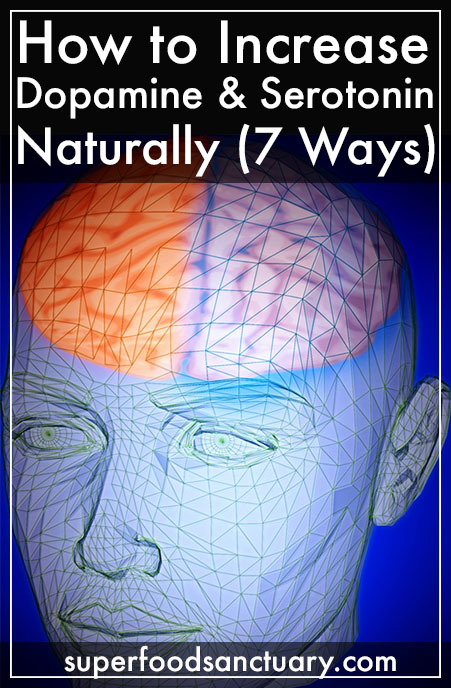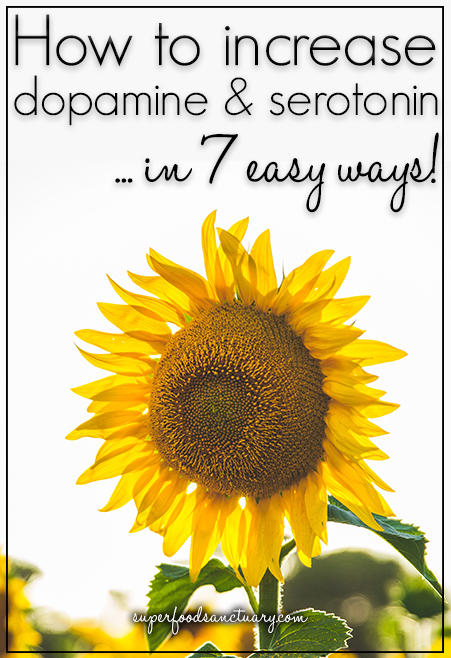Dopamine and serotonin are both chemicals produced in the body. Serotonin is known as the happy chemical and dopamine is a ‘feel good’ chemical. In this article, let’s look at ways how to increase serotonin and dopamine naturally!

What is Serotonin?
Serotonin is a neurotransmitter or hormone that is produced in the intestines and the brain. It has a wide variety of functions in the human body. It is most known for its mood balancing function.
As a neurotransmitter, serotonin transmits messages between brain cells. Some of its functions include:
- Mood Balancing – Serotonin has an impact on mood, happiness and anxiety levels.
- Appetite Control – Did you know that serotonin also plays a part in reducing appetite when you’re eating food?
- Bowel Movements – Serotonin is also produced in the intestines. In fact, most of the body’s serotonin is in the gastrointestinal tract, where it helps control and regulate bowel function and movements.
- Clotting – When you have a wound, platelets release serotonin which contributes to the formation of blood clots.
- Nausea – Serotonin stimulates the area in your brain which promotes nausea. When you eat something that unsettles your stomach, serotonin is produced which increases the time taken for the irritant to be expelled.
Symptoms of Low Serotonin Levels
Low serotonin levels lead to a number of disorders in the body. Here are some of the symptoms of low serotonin in the body:
- Dull moods
- Poor memory
- Craving starchy or sugary foods
- Difficulty sleeping
- Low self esteem
- Anxiety
- Aggression
- And more
What is Dopamine?
Dopamine can be described as a ‘feel good’ hormone. It is a neurotransmitter that helps control the brain’s reward and pleasure centers. Dopamine is produced in several areas of the brain. Stimulation of dopamine makes us feel good. Dopamine also pushes us to do things, which is what helps us focus and concentrate in our tasks.
Below are some of the functions of dopamine in our bodies:
- Body movements – Dopamine contributes to motor control and voluntary body movements made by a person.
- Emotional response – Dopamine levels affect important brain functions that affect one’s mood, sleep, memory, concentration and learning.
Symptoms of Low Dopamine Levels in the Body
The symptoms of low dopamine vary according to the underlying cause. People suffering from Parkinson’s disease (caused by dopamine deficiency) may have different symptoms from people suffering from low dopamine levels due to substance abuse. Let’s see the general symptoms you can face if you have low dopamine levels:
- Anxiety
- Fatigue
- Low sex drive
- Feeling demotivated and hopeless
- Loss of balance, stiffness in muscles
- Speaking or moving slower than usual
- Constipation
- Low energy and endurance
- Insomnia or trouble sleeping
- Muscle aches and pains
- Weight loss or weight gain
- Frequent pneumonia
- Depression and sadness
- Inability to concentrate and focus
- Among others
How to Increase Serotonin and Dopamine Naturally

Increased serotonin and dopamine levels lead to more productivity, happiness and general wellbeing! Here are natural ways on how to increase serotonin and dopamine naturally:
1. Do What You Love
What makes you happy? Hanging out with friends, painting, drinking a mug of coffee in the morning, dancing…do it!
Doing things you love will automatically make your brain secrete more serotonin and dopamine which makes you feel pleasure and happiness.
2. Eat these Foods!
Include foods that are rich in dopamine precursors and avoid foods that lower dopamine! Your body needs foods that contain essential nutrients such as Vitamin B6, iron, niacin and folate. Foods that increase dopamine include avocados, almonds, dairy products, pumpkin seeds.
Eat less saturated fat such as animal fat, butter, full-fat diary and palm oil among others. This is because when consumed in very large quantities, these saturated fats may disrupt dopamine signaling in the brain.
One way to pack all nutritious fresh produce to boost dopamine and serotonin is by making smoothies! Try:
If you’re a tea lover, there’s good news! Drinking herbal teas can also boost dopamine levels naturally. You can read about which teas can make you feel good in this article: 7 Uplifting Teas that Increase Dopamine
Read in detail:
- Top 10 Foods to Increase Serotonin and Dopamine Naturally
- Top 5 Nuts that Increase Dopamine and Serotonin
3. Consider Taking Supplements
You can take high quality supplements that increase serotonin and dopamine naturally! Supplements including magnesium, vitamin D, curcumin (found in turmeric), green tea extract and oregano extract have been linked to increased dopamine levels.
Read in detail:
4. Eat Probiotics
Probiotics have been getting increased attention in the world nowadays. That’s because the good bacteria in our bodies needs them to thrive. Did you know that the gut is also known as the ‘second brain’? Yes, research has shown that the brain and the gut are closely linked. Certain good bacteria that naturally live in the gut have the ability to produce dopamine, which contributes to your mood and emotional response.
Probiotic-rich foods include raw apple cider vinegar (ACV) with the ‘mother’, bananas, yogurt, kefir. You can also take probiotic supplements which can be easier to consume if you’re lactose intolerant or can’t seem to drink ACV.
5. Get More Light in your Life
Going outdoors in the sunshine is like taking a huge breath of fresh air! This especially goes to most of us who are stuck indoors studying at school or typing feverishly behind a computer at work.
A 2007 article published in “The Journal of Psychiatry and Neuroscience” noted that numerous studies showed exposure to bright light such as sunlight increases levels of serotonin in the brain.
Go for a morning walk outside your home, walk or cycle instead of driving to increase the amount of time you spent in sunshine.
6. Have A Good Night’s Rest
One of the key good habits for a healthy body is having enough sleep. Studies show that dopamine, which increase alertness and focus, is produced in large amounts in the morning when it’s time to wake up. In the evening during sleep hours, dopamine production decreases. Now staying up late can disrupt this natural body rhythm, making the availability of dopamine receptors reduce substantially the next morning. With low dopamine, you’ll feel low, groggy and unfocused the whole day. Try to get at least 6 hours of sleep every day.
7. Move that Body!
Many of us have sedentary lifestyles in this day and age. That’s because we have long working hours, too much on our schedule and commute to work using cars/the bus. We hardly get any time to work out.
But guess what? Exercising and getting your body to move for at least 30 minutes in a week has been linked to increased functioning of serotonin in the brain! When you regularly exercise, you’re also increasing the amount of tryptophan, which is a precursor of serotonin.
After working out, serotonin levels remain increased in the brain. So take some time to go jogging, walking, running or dancing every day. You’ll notice how happy and pumped up you’ll feel afterwards!

My husband had Parkinson’s. Is their a book i can get to fellow a diet.
How’s he now?
I was diagnosed with Parkinson’s disease in August 2019 and was prescribed Senemet. However, in December 2020 a DAT Brain scan test changed the diagnosis to (PSP) Progressive Supranuclear Palsy. Does anybody have any input as to treatment?My neurologist apparently expected me to continue taking the Parkinson ‘s medication which I stopped taking .
Thank you for this very helpful information
My husband has Parkinson’s. When he was first diagnosed, we went to the library and checked out every book the library had on Parkinson’s. About 6 of them. Some were better than others. But they all had one thing in common. They all stressed the importance of daily walking and exercise. We have a treadmill downstairs which he uses in bad weather, but when the weather is good, and not too hot or cold, I send him out to walk our neighborhood sidewalks, with a pair of walking poles for added stability. He wears a non-subscription emergency button around his neck, capable of calling 911 in case he falls and can’t get up. When he wants to walk up to the library, store, post office, or pharmacy, which are all within walking distance, I insist he roll a portable grocery cart in front of him for added stability as well as in helping him bring home books he has borrowed or things he has bought.
All of you people are the biggest joke ever. I have Parkinson’s too. WOW! I have Parkinson’s! So what’s your next step? We’ll get on your medication first and foremost! See a dietitian and get a good diet down and follow it… Then get your butt into a gym and join into the Silver Sneakers Program…. There is your answer you bumbling BOOBS! No supplements no Chinese, Japanese or Dirtyknees remedies… No Haitian VooDoo Dolls! You people want quick fixes and guess what? THERE IS NONE!!! OH AND DO A WORD SEARCH OR SOME SORT OF STIMULATION OF THE BRAIN GAME FOR S MINIMUM OF 30 A DAY!!! ALWAYS STIMULATE YOUR MIND. Do painting, crotchet, basket weaving, make your own clothes, something to stimulate yourself and USE YOUR IMAGINATION!!!! If you fall for this crud I have ocean front property in Wyoming next to Chaney For Sale if you’re a sucker…..,
Incidentally, the best book of the lot was, “Navigating Life with Parkinson’s Disease,” by Sotirios A. Parashos. 2nd edition (has revised information about newer medications.)